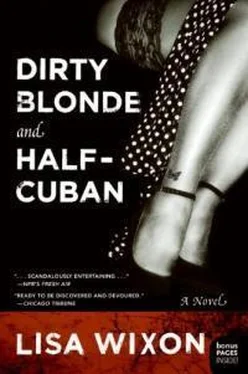Lisa Wixon - Dirty Blonde and Half-Cuban
Здесь есть возможность читать онлайн «Lisa Wixon - Dirty Blonde and Half-Cuban» весь текст электронной книги совершенно бесплатно (целиком полную версию без сокращений). В некоторых случаях можно слушать аудио, скачать через торрент в формате fb2 и присутствует краткое содержание. Жанр: Современная проза, на английском языке. Описание произведения, (предисловие) а так же отзывы посетителей доступны на портале библиотеки ЛибКат.
- Название:Dirty Blonde and Half-Cuban
- Автор:
- Жанр:
- Год:неизвестен
- ISBN:нет данных
- Рейтинг книги:4 / 5. Голосов: 1
-
Избранное:Добавить в избранное
- Отзывы:
-
Ваша оценка:
- 80
- 1
- 2
- 3
- 4
- 5
Dirty Blonde and Half-Cuban: краткое содержание, описание и аннотация
Предлагаем к чтению аннотацию, описание, краткое содержание или предисловие (зависит от того, что написал сам автор книги «Dirty Blonde and Half-Cuban»). Если вы не нашли необходимую информацию о книге — напишите в комментариях, мы постараемся отыскать её.
Dirty Blonde and Half-Cuban — читать онлайн бесплатно полную книгу (весь текст) целиком
Ниже представлен текст книги, разбитый по страницам. Система сохранения места последней прочитанной страницы, позволяет с удобством читать онлайн бесплатно книгу «Dirty Blonde and Half-Cuban», без необходимости каждый раз заново искать на чём Вы остановились. Поставьте закладку, и сможете в любой момент перейти на страницу, на которой закончили чтение.
Интервал:
Закладка:
I pay tuition for classes I’ll never attend, and sign my new carnet,a British-racing-green booklet with metallic embossing. I am semiofficially a cubana.For a year.
The room I rent is in Miramar, in a Spanish colonial home with Arabic tiling on the ceiling, and crossbeams of burnished wood. The family, three generations of esteemed doctors and medical professors, happily take me in. My $400 monthly contribution will supplement their combined $62 monthly salary the government doles out in worthless pesos.
The celebratory bottle of rum I shared with them over a criollomeal of black beans, rice, pork, and fried plátanoswas my first as a Cuban. With my bags and notes, I settled into the tourist room, the home’s nicest, feeling guilty that the others share cramped spaces along the western end of the house.
By the light of an oil lamp, I studied the map of Havana. Streets A through Z run parallel. Numbered ones cross them in between, like gloved fingers entwined in another’s hand. Obispo for pedestrians cuts from the wharf to Central Park. There, Calle Neptuno picks up and runs from boisterous, slummy Centro to middle-class Vedado. The waterfront curves around the barrios and swoops north through the glimmering suburb of Miramar.
The miracle of a map is that it shows how disparate neighborhoods come together; it delineates where and when they connect, eventually—at first divergent and then harmonious, like a composition by Beethoven. There is hope in a map. The exact space where latitude meets longitude is the promise it keeps.
I blew out the light and tucked in for a sleep that wouldn’t come.
In the morning, I took my thousands of dollars and taped piles of money to the bottom of the room’s furnishings. I should have known every Cuban is acutely aware that a norteamericanomay only use cash. That the American embargo prohibits wire transfers, advances, credit cards, and checks of every kind. A norteamericana,in Cuba for one whole year, would have to bring a lotof cash.
I was thinking this as I taxied home from my first meeting with Victor.
By the time I arrived at my casa,the money was gone.
No one was home. Later, the family blamed the neighbors.
The policemen just shrugged.
I had $500 to my name.
I cried for a week. I cried because the only person who could bail me out was the last person I wanted to speak with.
John.
10
T his is whatI remember doing. I remember changing my round-trip ticket to leave Havana the next day. I remember the man at airport customs, when I explained what’d happened, and how he said no, I couldn’t leave for Mexico; sadly, as if he wished to help. Next came the office of student affairs, then the Cuban office of foreign affairs, and finally, without care as to my punishment for being there illegally, the U.S. Interests Section, the building where my father reported to work every day more than twenty years before.
“You’re in a pickle,” said the woman behind the counter at the Interests Section, when I explained my situation. That’s all she could say, that I was in a pickle.
When I did finally phone my father in Washington, I had just enough money to cover the call.
I explained my plight. No, I couldn’t access cash. No, I couldn’t leave the country. No, there were no jobs for foreigners. I told him this, but heard nothing. I was sure the line had gone dead.
Finally, he spoke. “You called me two weeks ago and said you wanted to find your ‘real father’ in Cuba,” he said slowly. “You want to be a Cuban? Well, now you’re going to get just that. You get to spend the next year seeing exactly what your life would have been like had I not…” His voice trailed off.
“But I promised Mom I’d look for him—you remember, don’t you? That night in the hospital?”
But he was not listening. “I gave you a life most children, Cuban or not, would kill for. This is how I’m repaid?”
“I’m not here because I’m ungrateful,” I said, appealing. “Wouldn’t you be curious about your family, if you were in my shoes?”
“No, I wouldn’t,” he said sharply. “I wouldn’t at all. I’d be damned grateful I could pass for a Briggs and I’d leave it at that.”
I barely heard his words, or the full force of his Connecticut snobbery behind them. Instead, sensing his finality, I pleaded. “I’ll pay you back,” I said. “Every cent. I just need to make it through the next twelve months.”
A protracted silence.
Then, swallowing all my pride, I asked this: “Could you make a few calls, use your connections and see if I can get a visa out?”
His voice faltered, and he cleared his throat. “I’ve already lost one woman to Cuba. Do you think I want to lose another?” Then a sigh. “Is José Antonio going to take everyone precious from me?”
“Dad, please come and get me,” I said. “My friends can’t come here, you know this. They can’t get a license. You can. They can’t send money without violating the embargo and jeopardizing their foreign-service careers. Dad, youare the only one who can help me.”
“How can you call me ‘Dad’ and then go look for José Antonio? No. You want to go look for him—you go look for him. You’ve gotten yourself into this situation—”
“You can’t leave me here!” I was shouting then, sheer panic in my voice, and it ricocheted across the marbled lobby of the hotel. “If you leave me here…If you leave me, Dad—”
He interrupted. “I did everything I could to raise you like my own. I said this to your mother, and I’ll say it to you: It’s me or it’s him. You’re on your own.”
“Don’t—”
But he cut the phone line.
With the few dollars left on the calling card, I numbly began to dial Susie. Then I stopped myself. Of course Susie would come for me. She would wire me money and in doing so she would cast aside the risk to her own career ambitions. My other friends would do the same. For a moment, I wavered. But my father was right. I’d opened the wounds of my family’s history. I’d gotten myself into this mess, and it was my job to clean it up. Even if I had to do so alone.
As the receiver clicked heavy under my fingers, and as I glanced wildly about the hotel lobby, I realized that at that very moment I’d been abandoned. I was the biblical Abednego, and Cuba was the furnace Nebuchadnezzar had thrown me into.
But the more I looked around, at young, beautiful women on the arms of the tourists—ones temporarily privileged by the economic disparity of an impoverished land—I knew I wasn’t the only one left to fend for herself.
Just as it was for my brethren, the people of Cuba with whom I’d now share a life, the morality of my upbringing would begin to crumble around me, first in small, dusty pieces, and then, as the storm worsened, in bigger, heavier chunks. It was the day I agreed to debase myself. The day I began to exchange what was dear for eating, sleeping, and finding the one thing I desperately wanted.
My real family.
I looked around as I walked to Miramar to collect my things. Scenery I’d once found sad now brought encouragement. Well-dressed men on rickety Chinese bicycles. Tattered laundry hanging from the balconies of mansions of former opulence. A dignified old woman, whose jewelry no longer held its stones, hawking black-market cheese.
If these were my people, and I no longer doubted they were, they’d have to teach me exactly how to survive.
And survive I would.
Two
11
I ’m shiveringin the nude. The nurse hands me a ratty gown and ushers me into a room that looks like a Byzantine torture chamber. Cracked plaster and rusty metal contraptions hang off the walls.
“We don’t have beautiful facilities,” says the doctor behind the clipboard, reading my mind. “But guests from all over the world visit us. Our staff is the best in the hemisphere.”
Читать дальшеИнтервал:
Закладка:
Похожие книги на «Dirty Blonde and Half-Cuban»
Представляем Вашему вниманию похожие книги на «Dirty Blonde and Half-Cuban» списком для выбора. Мы отобрали схожую по названию и смыслу литературу в надежде предоставить читателям больше вариантов отыскать новые, интересные, ещё непрочитанные произведения.
Обсуждение, отзывы о книге «Dirty Blonde and Half-Cuban» и просто собственные мнения читателей. Оставьте ваши комментарии, напишите, что Вы думаете о произведении, его смысле или главных героях. Укажите что конкретно понравилось, а что нет, и почему Вы так считаете.












